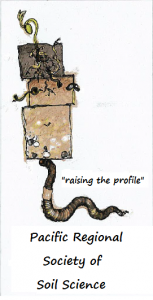FOR IMMEDIATE RELEASE
Vancouver, B.C. –Concerns about the future of the Agricultural Land Reserve in BC were highlighted at a March 29th workshop hosted by the Pacific Regional Society of Soil Science (PRSSS), a non-profit organization for professionals and students in the field of soil science and land resource management.
Themed on the intergenerational transfer of knowledge, the workshop drew soil scientists from around the province to discuss complex issues related to land use management and soil science, with a particular focus on the ALR. The workshop also honoured the life and contributions of Gary Runka (1938-2013), first general manager and later chair of the Agricultural Land Commission and one of BC’s most respected soil scientists.
Keynote speaker, soil scientist Dr. Terry Lewis, gave an overview of soil science and its role in establishing the ALR. Dr. David Connell, a professor in the School of Environmental Planning at the University of Northern British Columbia, spoke about the challenges of integrating public priorities, making particular note of food sovereignty as a growing part of the political landscape. All speakers emphasized the importance of science-based decision-making and urged young professionals to take an active part in public policy debates. .
With the introduction of Bill 24 just two days prior to the PRSSS workshop, there were serious concerns expressed by several senior professionals that the splitting of the province into two zones, one of which would receive less protection than the other, and the breaking apart of the provincial Agricultural Land Commission into six regional panels would take BC backwards. “With Bill 24, we will not only lose ground in the literal sense, but also in the public policy sense,” said Dr. Art Bomke, Professor Emeritus in the UBC Faculty of Land and Food Systems. “The ALR was established because local and regional authorities could not be relied upon to protect our scarce and irreplaceable farmland from non-farm development. The six panel system contained within Bill 24 potentially takes us right back to the 1973 situation that gave rise to the establishment of the provincial ALR and the provincial Land Commission in the first place.” Criticisms of Bill 24 came not only from established soil experts, but also from students and young professionals. “The reduced role of science as the basis for protecting farmlands within the ALR is deeply troubling to me”, said Dru Yates, a soil science graduate student at UBC. “Where is the evidence that Bill 24 will help the ALC preserve agricultural land and encourage farmers to farm it? I think the evidence points to the opposite.”
These concerns were echoed by Carolyn King, Communications Director for the PRSSS. “The majority of our 140 plus members are natural resource and soils students or young professionals, and they know that government policy decisions taken today will affect their lives in the future. We are the ones with the most at stake in the maintenance of sound, science based policies for land use decision making, such as the ALR.”
The dominant feeling at the workshop was that the soils that are represented by the ALR are unique in their productivity. They have been protected by the ALR for 40 years and Bill 24 threatens the degradation of both these soil systems and the food production dependent upon them.
Contact: Carolyn King (778-991-2300)
prsssemail@gmail.com
Download the release here: PRSSS NEWS RELEASE: Losing Ground on the ALR
